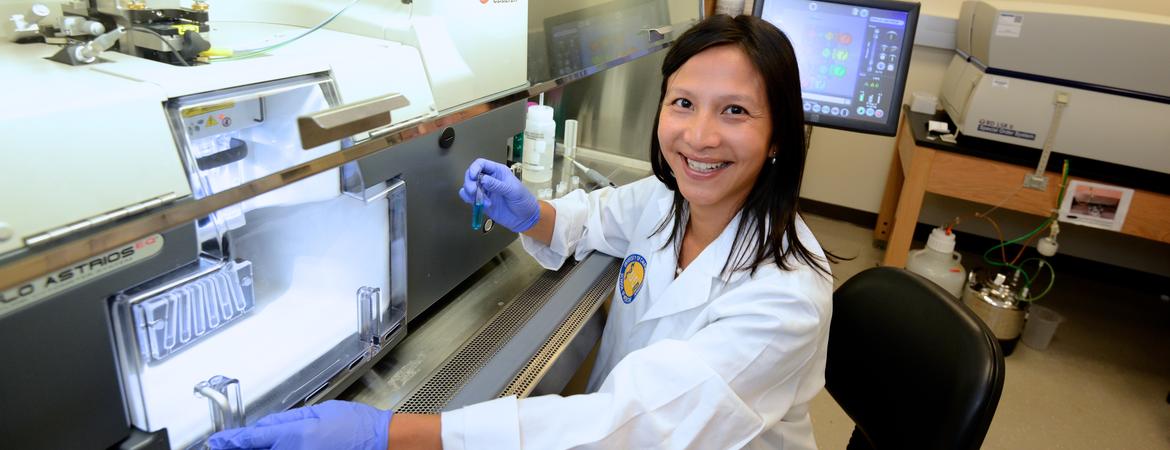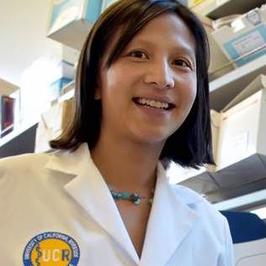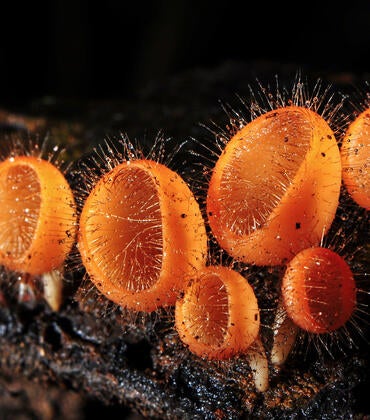
A biomedical scientist at the University of California, Riverside, has received a five-year, $3.3 million grant from the National Institutes of Health, or NIH, to investigate lung immune responses to parasitic worm infections.
The research will explore how macrophages, a type of white blood cell, mediate tissue repair following infection-induced injury.
“We will focus on a macrophage-secreted protein, RELMalpha, in mice and evaluate two aspects of its function in worm infection: how it regulates worm killing and how it promotes lung stem-cell growth to repair injured tissue,” said Meera G. Nair, an associate professor of biomedical sciences in the School of Medicine and the grant’s principal investigator.
Nair’s lab has generated a transgenic mouse that will allow her team to track and view the RELMalpha-expressing macrophages and also specifically delete RELMalpha in macrophages.
RELM, or resistin-like molecules, constitute a family of proteins secreted by mammals and highly expressed in infectious and inflammatory diseases. One of these proteins, RELMalpha, is quickly triggered in the mouse body following infection and serves to protect the body's tissues. Its homologue in humans, called resistin, is responsible more for protecting the body than attacking the parasite.
In collaboration with Tara M. Nordgren, an assistant professor of biomedical sciences and a lung immunologist at UC Riverside, Nair will investigate the stem cell-mediated mechanisms of lung tissue repair and the translational significance of the research team’s findings by evaluating resistin’s effect on tissue repair in donor human tissue.
Tolerance to infections, or disease tolerance, is a mechanism used by host organisms to fight parasites or pathogens that attack the host. Nair explained that host disease tolerance is especially important in infections with macroparasites, such as helminths, that cause significant tissue damage.
“Investigating these host disease tolerance mechanisms may be applicable to the treatment of tissue injury and inflammation,” she said. “The grant will allow us to investigate how RELMalpha contributes to host disease tolerance to helminths.”
Nair and Nordgren will be joined in the research by Adler R. Dillman, an assistant professor of nematology at UCR, to investigate how RELMalpha regulates macrophage-parasite interaction and parasite development. The project will involve the participation of two postdoctoral researchers, three graduate students, and two undergraduates.
According to Nair, the team’s evaluation of repair and anti-inflammatory mechanisms to promote lung tissue homeostasis may have relevance for COVID-19 infections, where severe pathological outcomes are related to excessive lung tissue damage and an inability to control the inflammatory response.
Nair has already formed partnerships with local medical centers as a result.
“We soon plan to investigate if the underlying immunoregulatory mechanisms we identify in the NIH-funded project could provide insight into the pathogenesis of lung diseases such as infections due to SARS-CoV-2, the virus that causes COVID-19, specifically focusing on how COVID-19 has impacted our community in the Inland Empire,” she said.
Research reported in this publication was supported by the National Institute of Allergy and Infectious Diseases of the NIH under Award Number R01AI153195. The content is solely the responsibility of the authors and does not necessarily represent the official views of the NIH.
Header image shows Meera G. Nair. (Carrie Rosema)





